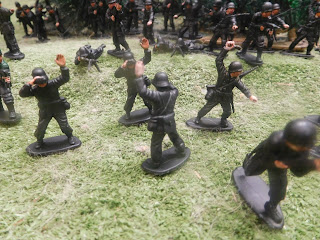When The present Is Indistinguishable From Science Fiction
Are you old enough to remember when those automatic Star Trek sliding doors were so remarkable? Of course, there were set people manually opening and closing them! Then there were those 'communicators'. Wouldn't it be so cool if you could carry your phone around with you like that? (They actually inspired the inventor of the mobile phone).
Once seeing and hearing so many people in the street apparently having animated discussions with themselves would cause you to think some strange contagion had hit humanity, or else there had been a mass escape from the local looney bin. Now we know that almost everyone has their own 'communicators'.
Also, we silently complain when the shop door does not compliantly open at our approach. What a drag it is to actually have to manually open the door!
I was a child in the sixties and there are many cultural changes that make me, sometimes, feel I am now in a foreign country. But the technological changes have just sort of snuck up. Sure, cars still have four wheels and don't speed through the air and space, like in the Jetsons. And the 60s cars were closer to that pleasing bubble shape than modern cars. Also where is my blasted robot maid? Oh wait...
Even the SF writers did not get that computers would get smaller and virtually every home would have its own computer, let alone our 'communicators' also being mini-computers. Most of them, though, don't flip open like in Star Trek. That IS a disappointment. Yet Artificial Intelligence can defeat world chess champions, compose poetry and so on.
As for actual robots, a great number of jobs have been taken over by robots. However, they are not those sassy robots with minds of their owns. The inventors are working on it. The Japanese are especially keen on that and including sex-bots; that must be why they don't have those square heads and bodies that used to be typical SF robots. Instead, they are trying to make them as life-like as possible.
Lasers? Yes, they are common but not those ones that emit a visible killing beam from a pistol or rifle. Still they have military usage, including blinding the enemy.
Which brings me to military developments. The Americans, in the 1980s, wanted a better helmet so they put the requirements of the helmet into a computer and it came up with what looked like a German helmet from WW2. That was a little embarrassing, but it was several decades after WW2. Anyway, several South American countries had never minded and still have actual German style helmets worn by parade troops.
The troops also wear body armor and the military scientists are working on full body armor. Invisibility is another area they have made some progress on.
There are also robot bomb disposal and droids. Well, they aren't yet those mech warriors that fascinate us so much, but the area of robot ethics is emerging. We also see this with self-driving cars. The latter are not yet wide-spread but they exist. How do they decide what to do in morally difficult situations? Should they swerve to avoid a dog and thus run over an old lady? Should the car take evasive action to survive but, in so doing cause a school bus to crash, and so on? How does a gun equipped robot decide whether to gun down a child who might be carrying an explosive device?
Now we are seeing, in Ukraine, the air drones transform warfare. Tanks and artillery are more vulnerable to these small devices. Inevitably counter measures emerge - the drone gun.
Don't you love the Men in Black? Those anti-drone guns also remind me a lot of some of the chunky weapons in Warhammer 40K.
Another thing: When Donald Trump was president, he announced the formation of a 'Space Force'. It is early days yet and, I think this was abandoned by President Biden. However, did anyone then think of Heinlen's Starship Troopers?












Comments
Post a Comment